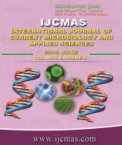


 National Academy of Agricultural Sciences (NAAS)
National Academy of Agricultural Sciences (NAAS)

|
PRINT ISSN : 2319-7692
Online ISSN : 2319-7706 Issues : 12 per year Publisher : Excellent Publishers Email : editorijcmas@gmail.com / submit@ijcmas.com Editor-in-chief: Dr.M.Prakash Index Copernicus ICV 2018: 95.39 NAAS RATING 2020: 5.38 |
Development of SNPs (Single Nucleotide Polymorphisms) marker is an important step to initiate the molecular breeding and genetic based studies. Identification and validation of polymorphic SNP will be valuable resource for gene tagging through linkage mapping/QTL mapping. In present study, two ecological ecotypes of Arabidopsis thaliana i.e. Col-0 and Don-0 exhibited variation at phenotypic level (leaf, flower, siliques and root related traits) and genotypic level (SNPs). Out of 500 SNPs, total 365 polymorphic SNPs were validated on Sequenome MassARRAY. These polymorphic SNPs would be very useful for genotyping of Col-0 and Don-0 mapping population to explore the quantitative trait loci for desired trait in future studies. Detailed analysis of selected SNPs gives the idea of their distribution in genome includes location with their nature. Location (coding and non-coding region) and nature (synonumous and non-synonumous) of SNPs may also create the phenotype diversity by regulation of genes in cis and trans regulatory mechanism and/or modulation of metabolic process and pathway. Identified non-synomous deleterious SNPs (G/C) may associate with biomass trait because it encodes a plastid-localized Nudix hydrolase that has FAD pyrophosphohydrolase activity (control growth and development). In addition, this SNP can alter the protein function by controlling riboflavin metabolism, purine metabolism and their related metabolic pathways which ultimately may responsible for phenotypic differences. Result suggested that SNP may lead phenotypic variability and associate with particular traits. Later, SNPs genotyping and QTL mapping would be helpful for candidate gene tagging and marker-assisted breeding in Arabidopsis.
 |
 |
 |
 |
 |